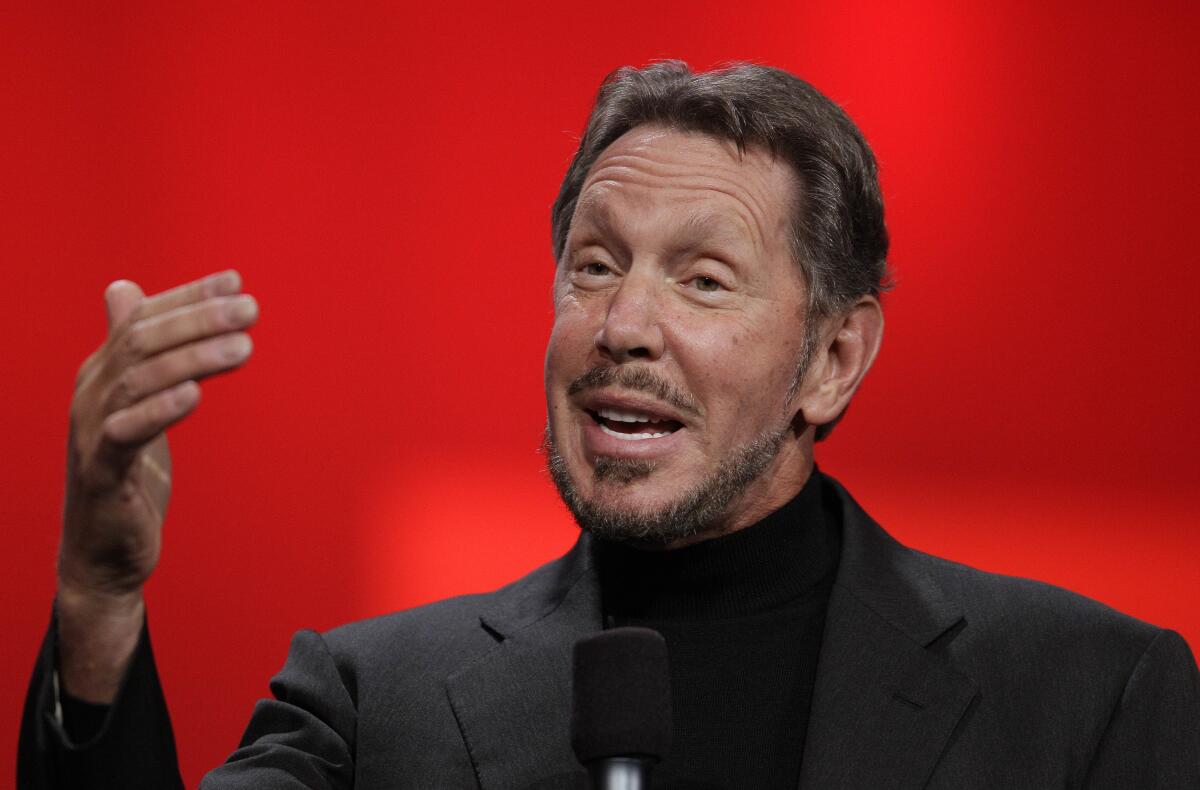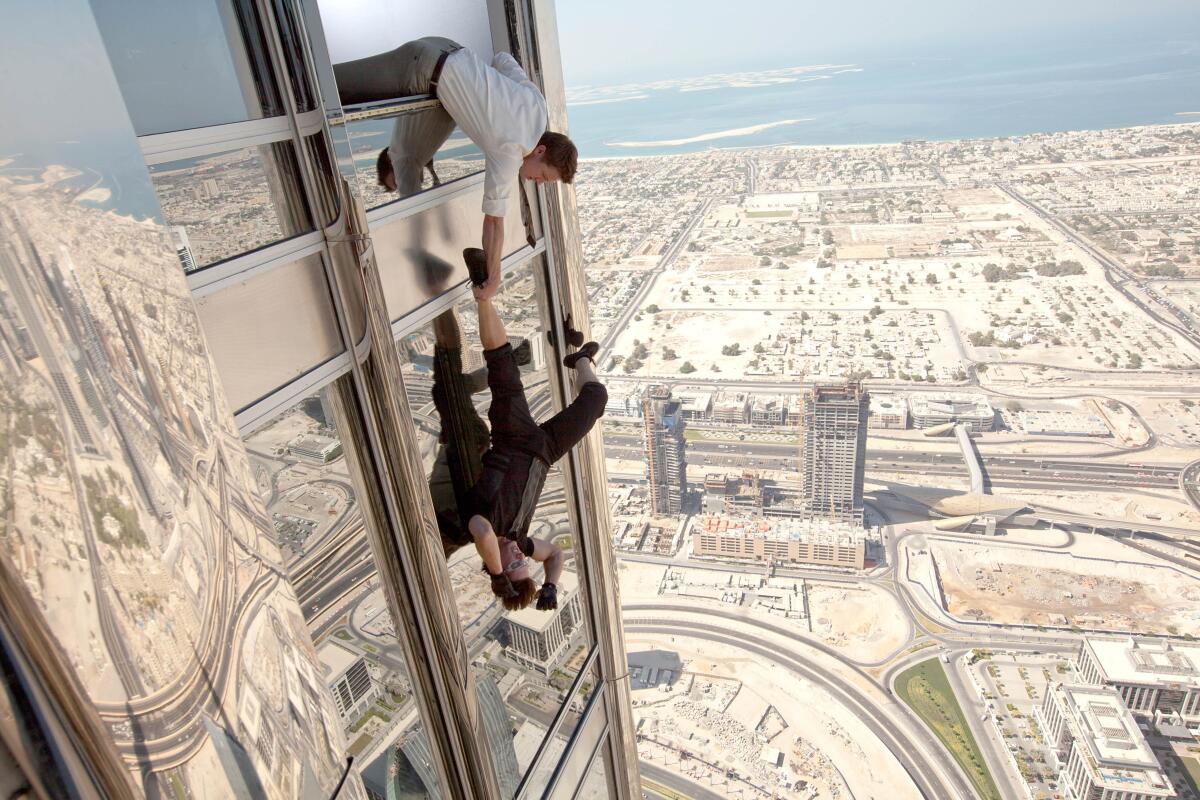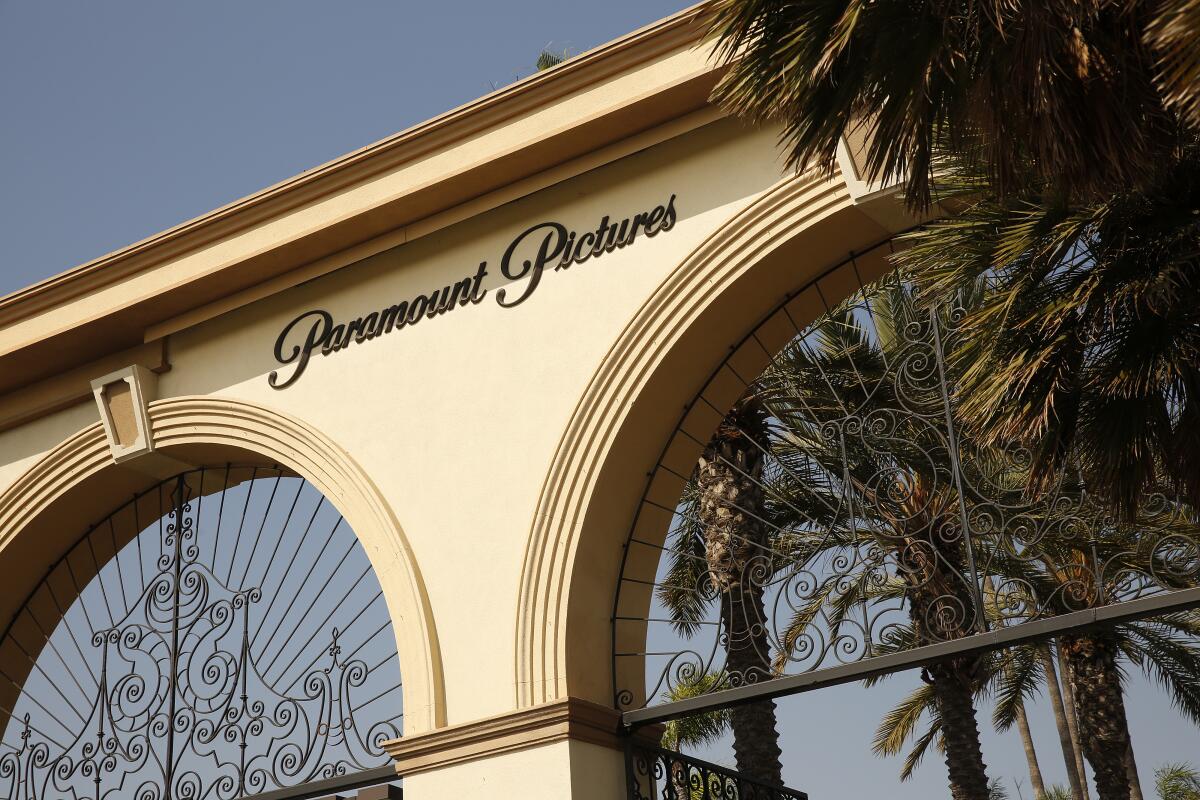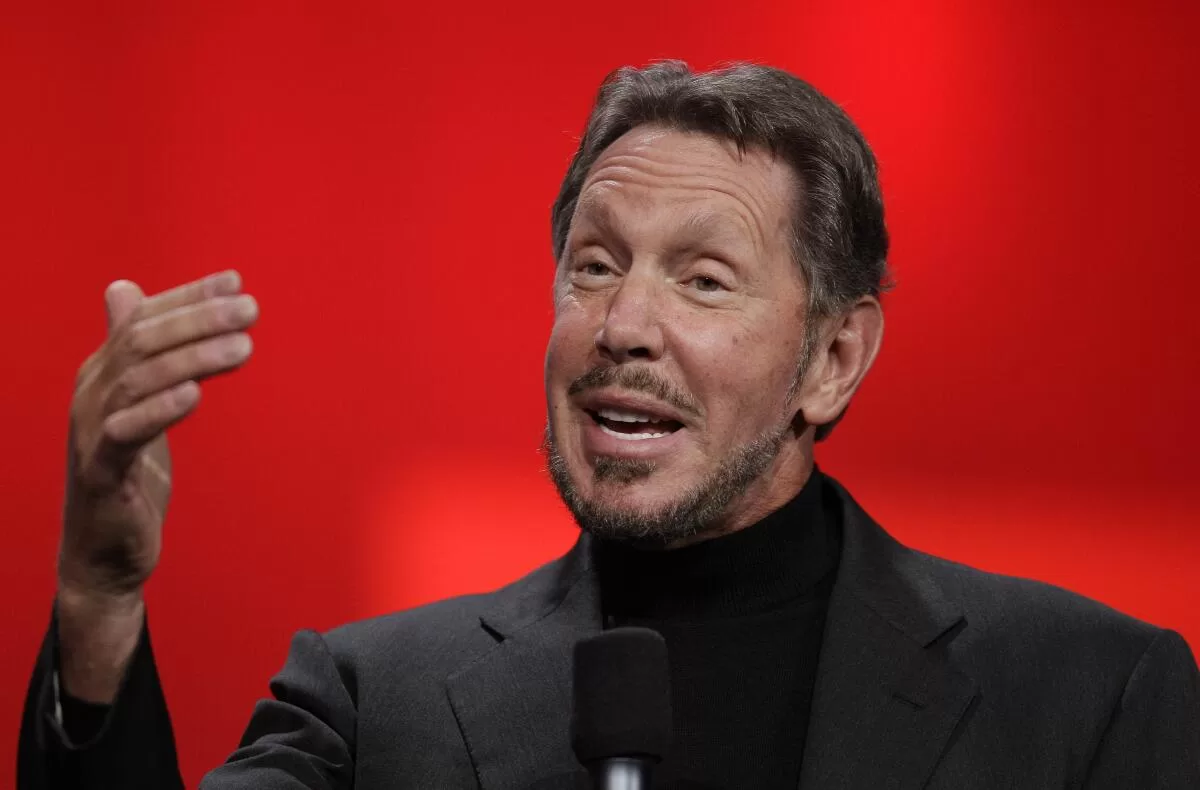Unlike most Hollywood neophytes of his ilk, however, Ellison did not flame out in ignominy or retreat much poorer for his efforts. Rather, Ellison (after a few hiccups) launched Skydance Media, a successful Santa Monica-based production company that has bankrolled a slew of massive box office and television hits such as “Top Gun: Maverick,” “Star Trek” and “Grace and Frankie,” and more recently, expanded into animation, sports and gaming. Two years ago, the company secured $400 million in funding, giving Skydance a valuation at more than $4 billion, and it now has 1,300 employees.
Today, Ellison’s Skydance Media is a strong contender to acquire Paramount Global in a deal that would give the 41-year-old control of the storied movie studio behind “The Godfather” and “Chinatown,” as well as a sprawling portfolio of assets including CBS Entertainment, the BET, MTV and Nickelodeon cable channels and a national movie theater chain — recasting Ellison from mega-rich Hollywood financier to even richer media mogul.
The proposed deal — it would see Skydance acquire National Amusements (the company that owns nearly 80% of Paramount Global’s voting shares) for $2 billion in cash, followed by Paramount Global buying Skydance in an all-stock deal worth $5 billion — has been backed by Shari Redstone, Paramount’s powerful nonexecutive chairwoman, but it is far from assured.
Shareholders have pushed back, saying the transaction would primarily benefit Redstone at the expense of regular investors. Earlier this month, in the midst of negotiations, four of the company’s board directors resigned over the planned merger.
“The last thing the company shareholders need is yet another silver-spooned movie enthusiast to run our entertainment company into the ground,” shareholder Blackwood Capital Management wrote in a blistering letter to Paramount’s board.
And Ellison’s bid faces some formidable competition: Sony Pictures Entertainment is in talks to join Apollo Global Management in its $26-billion offer for Paramount Global. Sony and Apollo must wait for an exclusive 30-day negotiation period that Paramount’s independent board of directors has extended to Ellison.
A spokesperson for Ellison and Skydance declined to comment.
Despite the shareholder opposition, Ellison remains confident that his deal will prevail, although it’s likely negotiations will continue beyond the 30-day period, said a source familiar with negotiations who was not authorized to comment.
If Skydance prevails in the Paramount takeover, it would represent a significant victory for Ellison and the latest consolidation in an industry still struggling from the upheaval caused by streaming and last summer’s labor unrest.
At the same time, it would bring some fresh challenges for the rising Hollywood player. Chief among them: Can Ellison transform Paramount, which is weighted down in debt and facing many of the same headwinds as other legacy companies with aging linear TV and cable assets, into a new and successful future?
“David has an institutional knowledge and an appreciation for the studio’s history and a real love of movies,” said Adam Goodman, former president of Paramount Pictures. “I don’t know his plan, but I would bet on that kid any day of the week.”
More than a trust fund kid
David Ellison was born in 1983, the first and only son of Larry Ellison and Barbara Boothe, the third of the tech tycoon’s four wives. When he was 3 and his sister Megan was 3 months old, their mother filed for divorce.
Ellison and his sister grew up with their mother on a horse farm in Woodside, in the Bay Area. Their father owned multiple properties, including, an 8,100-square-foot home nearby, modeled after a 16th century Japanese emperor’s palace.
When David Ellison was 10, his father had an estimated net worth of $1.6 billion and was named to Forbes’ billionaire’s list for the first time. As of this month, Larry Ellison’s fortune has morphed into $131 billion, making him the world’s 10th-richest man, according to the Bloomberg Billionaires Index.
During school breaks, David Ellison and his sister spent time with their father sailing around the world on his super yacht, Ronin.
By most accounts, it was Ellison’s mother who provided him with a grounding, steady influence. In exchange for doing chores, he received a $5 allowance, as he told the San Francisco Chronicle.
Ellison’s mother also nurtured his love of film. They went to movie openings every weekend. At home, she kept a collection of 2,000 VHS titles. Ellison and his sister would binge watch blockbuster franchises like “Star Wars,” “Jurassic Park” and the original “Terminator” movie.
When Ellison was 13, he and his father took flying lessons together. Thinking it would instill a sense of responsibility in his son, he bought him a German two-seat aerobatic monoplane, and on weekends the pair — alongside an instructor — staged mock dogfights over the Pacific, according to one of the elder Ellison’s biographers.
Although acutely aware of his extreme wealth, Larry Ellison took a rather pragmatic view on the effect it might have on his children.
“The sooner my kids get experience dealing with the pluses and minuses of having a lot of money, the better,” he told Matthew Symonds, author of the Larry Ellison biography “Softwar.”
Early on, the tech entrepreneur set up trusts for his children with large tranches of stock in Oracle, the company he co-founded in 1977 that went public in 1986; and later NetSuite, an enterprise software company he helped finance, that went public in 2007. Over time, the trusts, in addition to their independent holdings, have made David and his sister phenomenally wealthy.

Oracle CEO Larry Ellison is said to be supporting his son’s bid to acquire Paramount.
(Eric Risberg / Associated Press)
Ellison initially gave his children 90,000 shares of Oracle, according to Forbes. By 2013, the stock had split 10 times, increasing the trust to 29.2 million shares, then worth nearly $1 billion. Two years later, Forbes reported that Ellison’s heirs owned 2.8% of Oracle stock valued at more than $4.8 billion.
During high school, Ellison spent a pair of summers working at Oracle, but the tech universe held little interest for him.
After transferring from Pepperdine to USC’s film school, he dropped out in 2005 during his senior year to make his first film, “Flyboys.” (Megan was the boom operator on his senior thesis film. She later founded Annapurna Pictures, maker of critically acclaimed films including “Zero Dark Thirty.”)
Ellison co-starred with James Franco in the World War I aerial combat film, about a group of young Americans who volunteered for the French military. Ellison also put up 30% of the movie’s $60-million budget, in a deal brokered with then-ICM agent Jim Berg.
Tony Bill, the movie’s director, recalled Ellison as modest, well-mannered and someone who became popular with the other young cast members during filming. Bill, who won a best picture Oscar for producing “The Sting,” found Ellison’s demeanor “extraordinary.”
“He never said or behaved or implied in any way who he was behind the scenes.” When the rest of the cast did find out, Bill said, they were in shock. “It was like are you … kidding me? I can’t imagine anyone I’ve ever known who was famous or rich who didn’t find a way to drop it in along the way.”
“Flyboys” bombed, earning just $18 million at the box office worldwide.
Undeterred, Ellison stayed in the game. In 2010, he founded his production company, Skydance Media. He continued to act, appearing in a number of small roles, such as the best friend of a college golfer in the comedy “Hole in One.”
After “Twilight” star Taylor Lautner dropped out of Ellison’s movie “Northern Lights,” a film that he co-wrote and planned to co-star in, he abandoned acting.
“When that movie didn’t come together, it was a turning point,” Ellison told The Times in 2011. “Everything I’ve done has helped me to realize producing is all that I want to do.”
Around town, however, the episode bolstered the idea that Ellison was just a rich kid with what Hollywood likes to call dumb money.
While he had money, Ellison wasn’t dumb.
In addition to wealth, Larry Ellison provided his son with a cadre of his influential and powerful friends who made important introductions and advised him on the finer points of deal-making and negotiating.
Along with Jim Berg, who also sits on Oracle’s board, David Geffen became an early guide. Entertainment lawyer Skip Brittenham helped set up Skydance’s business plan.
But it was his father’s close friend, Apple co-founder Steve Jobs, who also built Animation Studios, that had a profound influence on Ellison.
Jobs offered to listen to hear Ellison’s pitch for Skydance, but he was skeptical.
“ ‘I want you to come back up here and talk about how you guys are going to aspire to make movies and tell stories better than anybody else, because that’s what we did at Pixar,’ ” Ellison told the “Sway” podcast, noting, “It very much changed the trajectory of the company.”
In 2010, Skydance raised $350 million to co-finance movies with Paramount Pictures. Ellison’s father put up a portion of the company’s $150-million equity and JPMorgan Chase & Co. provided a $200-million credit line. Last year, the company closed a five-year, $1-billion credit led by JPMorgan.
Skydance’s current stakeholders include the Ellison family, private equity firms RedBird Capital Partners and KKR and Chinese conglomerate Tencent Holdings.
The funds gave Ellison a venture in a slate of the studio’s big-budget, triple-A titles such as “Mission: Impossible,” “World War Z,” “Star Trek” and “G.I. Joe: Retaliation.”
Hitting it big with ‘Mission: Impossible’
Ellison got a taste of success right out of the gate. The first film released as part of the arrangement was “True Grit,” the Coen brothers’ western. Made for $38 million, it went on to gross more than $252 million globally while garnering 10 Oscar nominations, including a nod for best picture.

One of the first films released as part of a financing deal between Paramount and David Ellison’s Skydance was “Mission: Impossible: Ghost Protocol” in 2011, starring Tom Cruise and Jeremy Renner. The movie has grossed nearly $700 million.
(Moviestore / Shutterstock / Paramount Pictures)
In 2011 came the release of “Mission Impossible: Ghost Protocol,” which has grossed nearly $700 million, launching a slate of profitable popcorn fare. Ellison also married Sandra Lynn Modic, an actress he met on the set of “Hole in One.”
Despite his youth and relative inexperience, Ellison impressed those around him. “He was a very young person, but he was wise beyond his years, Goodman said.
“He stands by what he loves, said another producer who was has worked with Ellison. “He fought for the original construction of projects when the easy thing to do was to let the studio make choices.”
Skydance expects to generate about $1 billion in revenue this year and more than double that amount in 2025, the Wall Street Journal reported Friday.
Yet, Skydance has had its share of setbacks. Both “Gemini Man” and the “Terminator: Dark Fate” reboot failed to connect with either audiences or critics, or both.
Its investment in animation has yet to match the kind of success as its film and television productions. In 2019, Ellison hired former Pixar creative chief John Lasseter to head the unit to an onslaught of criticism. It was just six months after Lasseter’s ouster from the Walt Disney Co.-owned Pixar following allegations that he‘d engaged in inappropriate workplace behavior. The famous director acknowledged unspecified “missteps” in his dealings with employees. Emma Thompson withdrew from the company’s first animated feature, “Luck.”
“He’s had some hits and misses. But he’s been bold and aggressive and built a solid production company in Skydance,” one industry executive said of Ellison.
Goodman recalled how Ellison proved his mettle during the troubled production of “World War Z.” The movie’s delays, ballooning budget (it eventually cost $200 million) and clashes over whether it was a summer blockbuster or a geo-political allegory threatened to sink the film.
“We made a movie where some parts worked well and others were unwatchable,” Goodman said. “We had two choices: put a Band-Aid on it or go deep and make real creative and financial investments. David and his partners went all in. It was a real test of our partnership and testament to their ability to put their money where their mouth was.”
The film has grossed $540 million at the box office.
The Paramount Global acquisition would propel Ellison into a different stratosphere — with formidable challenges. Ellison and his partners would have to decide whether to continue to invest in Paramount+, its money-losing streaming service that has more than 67 million subscribers; as well the fate of the CBS broadcast network and the company’s many struggling cable channels, like MTV.

The Melrose Gate of Paramount Pictures in Hollywood. Skydance is seeking to buy the studio.
(Al Seib / Los Angeles Times)
More urgently, Ellison must contend with Paramount’s restless shareholders and board members who have objected to the Skydance deal on offer.
The viability of the Skydance deal depends on whether shareholders are willing to believe that the bid — and Ellison’s leadership — will pay future dividends that will exceed the current dilution of their shares, said Nelson Granados, executive director for the Institute for Entertainment‚ Media‚ and Sports at Pepperdine University.
But Ellison’s father’s tech connections — and deep pockets — could help bolster Paramount, particularly if there are new advancements in artificial intelligence, digital production or distribution, he said.
“Can they bring Paramount to the 21st century basically is the big question,” said Granados.
Times staff writers Samantha Masunaga and Meg James contributed to this report.
